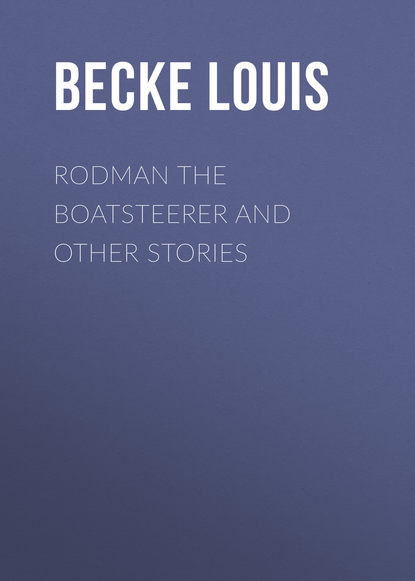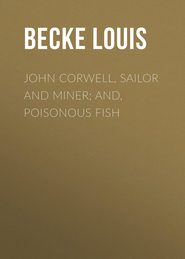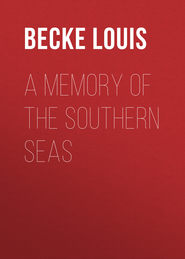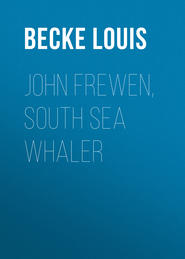По всем вопросам обращайтесь на: info@litportal.ru
(©) 2003-2024.
✖
Rodman The Boatsteerer And Other Stories
Настройки чтения
Размер шрифта
Высота строк
Поля
The change was soon made, and Moreno, the Chilian overseer, grinned when he saw the white-robed figure of the manager’s wife lying on one of the verandah lounges, playing with her child.
“Bueno,” he said to Sherard that night, as they drank together, “the plan works. Make the bird learn to love its pretty nest. Dios, when am I to feel my knife tickling Senor Prout’s ribs?”
“At the end of the crushing season, I think,” answered Sherard coolly; “the brat will be old enough to be taken from her by then.”
It is a bad thing for a man to “thump” either a Chilian, or a Peruvian, or a Mexican. And Prout had “thumped” the evil-faced Chileno very badly one day for beating a native nearly to death. Had he been wiser he would have taken the little man’s knife out of his belt and plunged it home between his ribs, for a Chileno never forgives a blow with a fist.
III
“Are you going over to Halaliko to-night, Prout?” asked Sherard, walking up to where his manager and Marie sat enjoying the cool of the evening. He threw himself in a cane chair beside them and puffed away at his cheroot, playing the while with the little Mercedes.
“Yes, I might as well go to-night and see how the Burtons have got on,” and Prout arose and went to the stables.
Sherard remained chatting with Marie till Prout returned, and then, raising his hat to her, bade them good-night.”
“Don’t let Burton entice you to Halaliko, Prout,” he said with a laugh; “he knows that your time here is nearly up.”
Prout laughed too. “I don’t think that Marie would like me to give up Kalahua for Halaliko—would you, old girl?”
She shook her head and smiled. “No, indeed, Mr. Sherard. I am too happy here to ever wish to leave.”
Whistling softly to himself, Prout rode along the palm-bordered winding track. It was not often he was away from Marie, but he meant to take his time this evening. It was nearly five miles to Burton’s plantation at Halaliko, and half an hour would finish his business there. He knew that, as soon as he left, Marie would tell the native servant to go to her bed in the coolie lines, and then she would herself retire; and when he returned he would find her lying asleep with her baby beside her.
To the right the road wound round a great jagged shoulder of rocky cliff, and clung to it closely; for on the left there yawned a black space, the valley of Maunahoehoe, and, as he rode, Prout could see the glimmer of the natives’ fires below—fires that, although they were but distant a few hundred feet, seemed miles and miles away.
A slight sound that seemed to come from the face of the cliff above him caused him to look upwards, and the next instant a heavy stone struck him slantingly on the side of his head. Without a sound he fell to the ground, staggered to his feet, and then, failing to recover himself, vanished over the sloping side of the cliff into the valley beneath.
A shadowy, supple figure clambered down from the inky blackness of cliff that overhung the road, and peered over the valley of Maunahoehoe. It was Moreno, the Chilian.
“Better than a knife after all; Holy Virgin, he’s gone now, and I forgive him for all the blows he struck me.”
Long before daylight, Prout, with his face and shoulders covered with gory stains, staggered into the native village at Maunahoehoe and asked the people to lend him a horse to take him back to Kalahua.
When within half a mile of Kalahua, almost fainting from loss of blood and exhaustion, he pulled up his horse at a hut on the borders of the estate and got off. There were some five or six natives inside, and they started up with quick expressions of sympathy when they saw his condition.
“Give me a weapon, O friends,” he said. “Some man hath tried to kill me.”
A short squat native smiled grimly, reached to the rafters of the dwelling, and took down a heavy carbine, which he loaded and then handed to the white man.
“‘Tis Moreno who hath hurt thee,” said the native; “at midnight he rode by here in hot haste.”
With the native supporting him, Prout rode along the road to the Estate gates.
As he reeled through he heard a faint cry.
In another minute he was on the verandah and looking through the French lights into Marie’s dimly-lighted bedroom. An inarticulate cry of anguish burst from him. Sherard and his wife were together.
Steadying himself against a post he took aim at the trembling figure of his wife, and fired. She threw up her arms and fell upon her face, and then Sherard, pistol in hand, dashed out and met him.
Ere he could draw the trigger, Prout swung the heavy weapon round, and the stock crashed into the traitor’s brain.
“It is the death of a dog,” said the native, spurning the body with his naked foot.
She was dying fast when Prout, with love and hate struggling for mastery in his frenzied brain, stood over her.
“He took my child away from me,” she said.... “He said he would kill her before me,… and it was to save her. Only for that I would have died first. Oh, Ned, Ned–”
Then with a look of unutterable love from her fast-dimming eyes, she closed them in death.
That was why Prout, after two years of madness in a prison, had stepped on board Hetherington’s schooner and asked the captain to take him away somewhere—he cared not where—so that he could be away from the ken of civilised and cruel mankind and try and forget the dreadful past.
IV.
They are a merry-hearted, laughter-loving race, the people of white-beached Nukutavau, with whom the trader lived. To them the grave-faced, taciturn man, who cared not to listen to their songs or to watch their wild dances on the moonlit beach—as had been the custom of those white men who had dwelt on the island before him—was but as one afflicted with some mental disease, and therefore to be both pitied and feared. At first, indeed, when he had landed, carrying his child in his arms, to bargain with Patiaro, the chief, that the people should build him a house, the women of the island had clustered around him as he stepped out of the boat, and with smiles upon their faces, extended their arms to him for the child. But no answering smile lit up the man’s rugged features, though, to avoid the appearance of discourtesy (to which all island races are so keenly sensitive) he gave the infant into the keeping of old Malineta, the mother of the chief.
Patiaro, the chief, holding the stranger’s right hand in both his own, looked searchingly into his calm, deep-set eyes with that dignified curiosity which, while forbidding a native to put a direct question to an utter stranger, yet asks it by the expression of his face. But Prout, whose anxious glance followed the movements of the grey-haired mother of the chief, as she pressed his child to her withered bosom, seemed to notice not his questioning look.
Following the stranger’s gaze, the chief broke the silence:
“‘Tis my mother, ariki papalagi.[2 - White gentleman.] who carries thy child—Malineta, the mother of Patiaro, the chief of Nukutavau, he who now speaks to thee. And I pray thee have no fear for the little one.”
The quiet, dignified courtesy with which the chief addressed him recalled the white man to himself, and a pleasant smile lit up the native’s features when the stranger answered him in Tokelau—the lingua franca of the equatorial isles of the Pacific—north and south.
“Nay, I fear not for the child, Patiaro, chief of Nukutavau, but yet it may not be well for her to be taken to the village awhile; for with thee and thy people doth it rest whether the child and I remain here, or return to the ship and seek some other island whereon I may build my house and live in peace. And I will pay thee that which is fair and just for house and land.”
But in those days, before too much civilisation had brought these simple people deadly disease, Christianity, and the knowledge of the great Pit of Fire, the brown men thought much of a white man; and so Patiaro, the chief, made haste to answer:
“Let the child go with my mother, and tell thou the men in the boat that everything thou desirest of me and my people to do shall be done. Five rainy seasons have come and gone since a white man has lived here; so I pray thee, stay.”
The white man inclined his head; then he turned and walked to the boat, and spoke to the captain of the little vessel which, to bring him to the island, had dropped her anchor just outside the current-swept passage of the lagoon.
“I am remaining here, Captain Hetherington. Will you let your men put my gear out on the beach?”
Hetherington, the skipper, looked at his passenger curiously, and then answered:
“Cert’nly. But I’m real sorry you are leaving us, I don’t want to pry inter any man’s business, and you know these islands as well as I do; but I guess I wouldn’t stay here if I war you. Why, it won’t pay a man to stay and trade on a bit of a place like this,” and he cast a deprecatory look around him.
The trader made him no answer, and the skipper of the schooner, ordering his crew to take out his passenger’s goods and carry them to the village, stepped ashore, and held out his hand to the chief, whose fine, expressive features showed some signs of fear that the captain’s remarks were intended to dissuade the stranger from remaining on the island.
Motioning to the white men to follow him, the stalwart young chief led the way to the fale kaupale, or council-house of the village, where food and young coconuts for drinking were brought in and placed before them by the young women.
Sitting directly in front of his guests, the chief served them with food with his own hands, in token of his desire for friendship and to do them honour, and then quietly withdrew to direct the natives who were carrying the trader’s goods up from the boat to his own house, further back in the village.
“I would wish ter remark, mister,” said the American skipper as he pulled out his pipe and commenced to fill it, “thet, ez a rule, I don’t run any risk ev bustin’ myself with enthoosiastic admiration fer Britishers in general—principally because they air the supporters of er low-down, degradin’ system ev Government, which hez produced some bloody wars and sunk my schooner the Mattie Casey, with a cargo of phosphates valued et four thousand dollars.”
“It was a heavy loss to you, Captain Hetherington, but you surely do not dislike all Englishmen because the Alabama sunk your vessel?” said the trader, with a melancholy smile, whilst his restless eye sought the village houses to discern the movements of the chief’s mother with his child.
The American pulled his long, straggling beard meditatively. “Wal, I don’t know, they’re a darned mean crowd anyway.” And then, with a sudden change of manner, “Say, look here, mister; hev yew finally made up your mind ter remain on this island among a lot ev outrageous, unclothed, ondelikit females, whar every prospeck pleases an’ on’y man is vile; or air yew game ter come in pardners with me in the schooner an’ run her in the sugar trade between ‘Frisco and Honolulu?”











